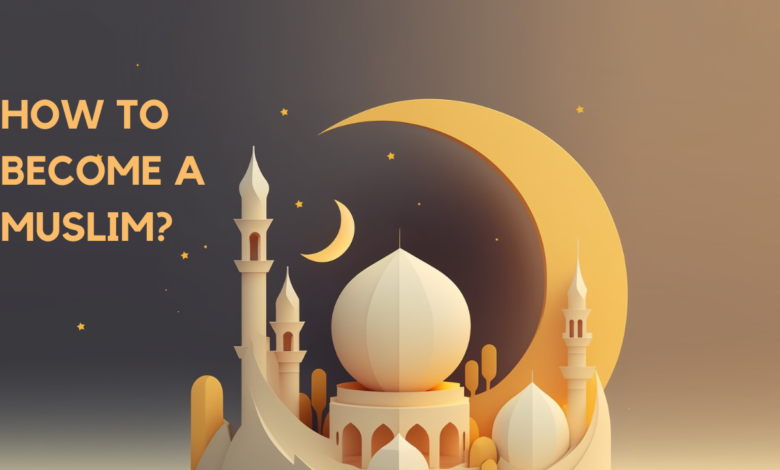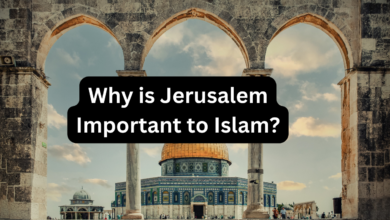
How to Become a Muslim?
Becoming a Muslim means accepting the Islamic faith, embracing its beliefs, and committing to a way of life based on the teachings of Islam.

Introduction
Becoming a Muslim is a significant and deeply personal decision. Whether you’re drawn to Islam for its rich history, profound spirituality, or its sense of community, the journey to becoming a Muslim is a transformative and rewarding one. This step-by-step guide will help you understand the process and offer insights into what it means to embrace the Islamic faith.
Seek Knowledge
Before making the commitment to become a Muslim, it’s essential to gain a basic understanding of the religion. Start by reading books about Islam, watching documentaries, or attending lectures at a local mosque. The more you know, the better you can make an informed decision.
Also check.
- What is Haram?
- Who is the Current Caliph of Islam?
- What Foods are Forbidden in Islam?
- When was Islam Founded?
- Where did Islam Originate?
Find a Mentor
Once you’ve acquired some knowledge about Islam, consider finding a mentor or a knowledgeable friend who can help answer your questions and guide you through the process. An experienced Muslim can provide valuable insights and support as you explore your faith.
Visit a Mosque
A mosque is the central place of worship for Muslims. Visiting a mosque will give you the opportunity to witness Islamic practices and meet members of the Muslim community. You’ll also have a chance to speak with an Imam (spiritual leader) who can provide more information and guidance.
Reflect and Pray
Taking time for self-reflection and prayer is essential. It’s important to pray sincerely to God and ask for guidance in your journey. Muslims pray five times a day, so consider engaging in these daily prayers to become familiar with the practice.
The Declaration of Faith (Shahada)
The Shahada is the core declaration of the Islamic faith, and it is the official act of converting to Islam. It is a simple statement in Arabic: “La ilaha illallah, Muhammadur rasulullah,” which translates to “There is no god but Allah, and Muhammad is the Messenger of Allah.” Saying the Shahada sincerely in your heart and aloud, preferably in front of witnesses, signifies your acceptance of Islam.
Embrace the Five Pillars
Islam is built on five fundamental pillars:
- Shahada (Declaration of Faith): We’ve covered this step.
- Salah (Prayer): Muslims pray five times a day, facing the Kaaba in Mecca. Learn how to perform these prayers and strive to pray regularly.
- Zakat (Charity): Give to those in need, typically 2.5% of your annual savings.
- Sawm (Fasting): During the holy month of Ramadan, fast from dawn until sunset. This involves abstaining from food, drink, and other physical needs during daylight hours.
- Hajj (Pilgrimage): When financially and physically able, undertake a pilgrimage to Mecca, Islam’s holiest city.
Continue Learning
The process of becoming a Muslim doesn’t end with the Shahada; it’s an ongoing journey. Continue learning about the faith, its teachings, and strive to live according to Islamic principles. Attend Islamic classes, engage in discussions with fellow Muslims, and seek to deepen your understanding of the Quran, the holy book of Islam.
Seek Support
Join a local Muslim community or social group to find support, camaraderie, and guidance. Building strong connections with other Muslims will help you integrate into the community and provide a network for spiritual and personal growth.
Conclusion
Becoming a Muslim is a profound and life-changing decision, one that involves not only faith but also a commitment to a way of life rooted in spirituality and community. Remember that the journey to becoming a Muslim is a personal one, and the steps outlined in this guide can serve as a helpful roadmap, but it’s essential to seek knowledge, connect with the Muslim community, and continue to grow in your faith. Embracing Islam is a lifelong journey that can be immensely fulfilling, bringing you closer to God and fostering a sense of belonging within a vibrant and diverse global community.

FAQs
What does it mean to become a Muslim?
Becoming a Muslim means accepting the Islamic faith, embracing its beliefs, and committing to a way of life based on the teachings of Islam.
Is there a specific ritual for converting to Islam?
Yes, the central act of conversion is the Shahada, where one declares, “There is no god but Allah, and Muhammad is the Messenger of Allah” with sincere intent. It is often done in the presence of witnesses.
Do I need to change my name to become a Muslim?
No, changing your name is not a requirement, but some converts choose to adopt a Muslim name as a symbol of their new faith.
Are there any age restrictions for converting to Islam?
There are no specific age restrictions for conversion. People of all ages can embrace Islam, and many do so at various stages of life.
Do I need to know Arabic to become a Muslim?
No, you don’t need to know Arabic to convert to Islam. While Arabic is the language of the Quran, it is not a requirement for new converts. You can learn and practice the faith in your native language.
What is the role of a mentor or sponsor in the conversion process?
A mentor or sponsor can provide guidance, support, and answer questions during your conversion journey. They can help you learn about Islamic practices and traditions.
Is it necessary to visit a mosque before converting to Islam?
Visiting a mosque is not mandatory, but it can be a helpful step to understand Islamic practices and meet the Muslim community. It’s an excellent way to get more information and connect with local Muslims.
How do I start praying as a new Muslim?
You can begin learning how to pray by seeking guidance from a knowledgeable source, such as a mentor or mosque. There are specific prayers (Salah) that Muslims perform daily, and you can gradually incorporate them into your routine.
What are the ongoing responsibilities after converting to Islam?
As a Muslim, you are expected to continue learning about the faith, regularly perform prayers, give to charity (Zakat), fast during Ramadan (Sawm), and consider making the pilgrimage to Mecca (Hajj) if you are financially and physically able.
Can I change my mind after converting to Islam?
Yes, you have the freedom to change your beliefs. Conversion to Islam is a personal choice, and you are not bound to it if you decide to leave the faith. Islam upholds the principle of free will and choice in matters of faith.




